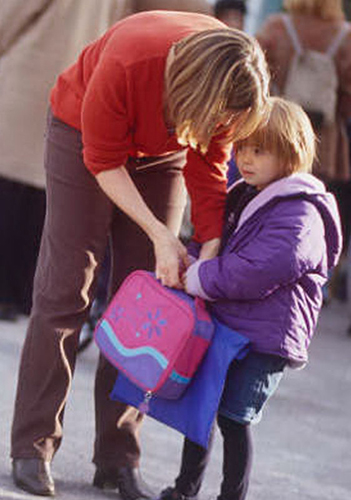Time flies when your child is a toddler and before
you know it you will be planning for her first day at school. If she has
been getting used to spending time with other children, you may also
notice an increasing hunger to try new things or a need to be constantly
stimulated by new challenges.
Toddlers on the verge of
starting school can often be quite a handful because they are growing up
so fast. Your child may seem clearly ready for the next step in her
life. Not all schools share the same criteria for deciding when a child
might be ready to enroll but, in general, children will start soon after
their fourth birthday.
Although each school may
look for different skills and levels of ability, one thing remains
constant: your child needs to have competent social skills for her age,
be able to sit and pay attention, be able to listen and follow
instructions, and be able to share attention with other children.
Generally speaking, you are likely to have been introducing these skills
at home—every time she sits to have a meal, each time she listens to a
story, whenever she plays with another child, and so on.
First day
Incredibly, your child will be ready to start school soon after
her fourth birthday. This is a major milestone for both of you, but try
not to let your anxieties show.

Easy first steps from home to school:
Visit
the school with your toddler before her first day so that she knows
what to expect in advance, and for your own peace of mind. The school
environment will be quite different than home, although some elements
will be similar to preschool.
Use
pretend play to get her used to what might happen in a classroom or in a
playtime situation, and read “going to school” books together.
Help your child build her confidence by encouraging her to try new activities and not give up.
Help
her to be more independent by choosing clothes she can manage
unassisted. Opt for Velcro fastenings rather than laces on her shoes.
Praise her ability to manage her feelings and develop self-control.
Encourage her to talk and to ask questions that develop empathy with other children. (“What’s wrong with Zak? Why is he sad?”)
Arrange for your child to attend half days only, initially.
Make a “going to school” scrapbook.
Your feelings and attitude
Your child’s first day at
school is a day that you are likely to remember for the rest of your
life. She will head off with excitement, and probably some fear—and so
will you! The impact of waving goodbye on that first day can be quite
profound for some parents. If you find yourself feeling anxious, try to
manage your feelings so that your toddler does not pick up on your mood
and does not need to worry about you.
Even if you hated
school yourself, stay positive, so that your past experiences don’t
impact how you talk about your child’s school or her teachers. If you
can avoid discussing any concerns you may have in front of your child,
you will avoid causing her unnecessary worry. Make time to visit the
school, get to know the teachers and other parents—most of all, take
time to share your child’s excitement.
Dr. Benjamin Spock
The author of the world-famous Common Sense Book of Baby and Child Care,
Dr. Benjamin Spock (1903–1998), was probably the most influential
pediatrician of the 20th century and one of the first to propose a move
toward child-centered parenting.
He had a great
interest in family dynamics and children’s needs, and spent six years
studying psycho-analysis, which gave him a unique perspective on child
care and parenting. The standard advice at the time was that picking up
infants when they cried would spoil them. Spock’s view was that cuddling
and showing them affection would make them happier and more secure.
Instead of recommending regimens for everything from discipline to
toilet training, Spock urged parents to take a flexible approach and to
see their children as individuals. He assured them that they were all
child-care experts.
He introduced the idea that parenting was allowed to be fun, and that mothers and fathers could actually enjoy their children.
His ideas were revolutionary
at the time, and were in stark contrast to the general advice of
doctors and other child-care professionals of the day. Some argue that
he was the father of the permissive society. In his lifetime, Spock’s
book sold more than 50 million copies and was translated into 39
languages.